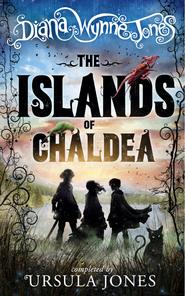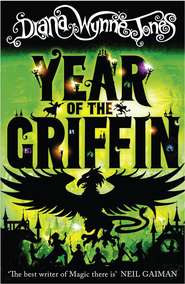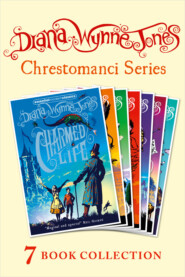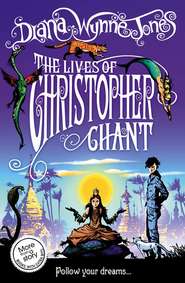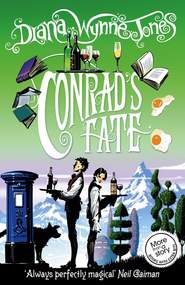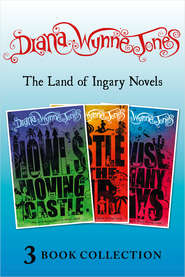По всем вопросам обращайтесь на: info@litportal.ru
(©) 2003-2024.
✖
The Dark Lord of Derkholm
Настройки чтения
Размер шрифта
Высота строк
Поля
Derk was thoroughly unnerved. “I – I’d be honoured,” he managed to say.
Umru clapped his chubby hands. Instantly a group of young boys, who had obviously been waiting outside for the signal, came hurrying in with a folding table, beakers, jugs, plates and trays of food. The trays were probably gold. The glassware was exquisite crystal. The food smelt wonderful. Derk had forgotten that the worshippers of Anscher never ate meat, but the various dishes were so beautifully cooked that he hardly noticed they were all made of vegetables. He slipped a particularly fine pasty into his pocket to show Lydda. And when the boys raced in again with bowls heaped with fruit, Derk wanted to take the strangest sort for Elda, but he did not quite like to, not after the pasty.
“Try one of these, Wizard,” Umru said. “You won’t have met this fruit before. I bought them off one of Mr Chesney’s tour agents – we often do little deals on the side, you know. She called them oranges, I believe.”
“They are,” said Derk. “Orange, I mean.”
Umru laughed. “You peel the outside off,” he explained. “Like this. Then the inside splits into pieces, just as if one of their gods had designed them for people to eat. Remarkable, aren’t they?”
“Mm.” Derk was not sure he liked the sharp, definite taste, but he was sure Elda would.
“Take another home with you,” Umru said generously. “I have two dozen. I only paid four gold for them, too.” While Derk weighed the orange globe in his hand, thinking the thing was rather like one of Callete’s early gizmos, Umru added, “They have pips. The young woman told me that they grow well in warm, dry conditions. I think they grow like apples, on trees.”
“Ah.” Derk looked up to see Umru smiling meaningly.
“I would buy as many as you could grow,” Umru said. He clapped his hands again and the boys brought water and cloths. As Derk washed the pungent juice off his fingers, he realized that he would only need a couple of trees, at two gold for a dozen fruit, to earn the money for that fine. But they might take years to grow. Umru looked sideways at him as they dried their hands, almost uncertainly. “I – er – have another small favour to ask, Wizard, something more along the lines of what you usually do for me.”
“Ask away,” said Derk.
“I need forty or so newly severed heads to go on stakes all over the city when the tours come through,” Umru explained. “This year I am the kind of priest who beheads heretics. Could you—?”
“No trouble at all,” said Derk.
Umru looked so relieved that Derk saw the man had been truly worried in case his refusal to help with the god had annoyed Derk into refusing to work magic for him.
“I promise to move the battles if I can,” Derk assured him.
Umru heaved himself to his feet. “As I said, every man has his sticking-point,” he said, showing Derk he was right.
He led Derk outside and down steep stairs. It was almost like Derk’s usual visits. Up to now, Derk had been feeling quite out of his depth. No one had tried to bribe him before, nor did he know how to deal with Umru’s religious experiences; but there was no uncertainty when it came to putting a spell on a sheep’s head or so. Then he saw what Umru had waiting for him, piled in a small courtyard below. Derk stared at the heap of old yellowy-brown human skulls and swallowed.
“Where—?”
Umru smiled. “We fetched them up from the catacombs. They were all priests once. I hope they don’t worry you.”
“Not at all,” Derk lied.
He took a deep breath and began. It was the sort of thing he was good at and so used to that he could have done it with his eyes shut. Before long, he did have his eyes shut most of the time. The skulls, under his hands, turned back into the people they had once been, but without their bodies. None of them seemed to like the experience. Most of them stared at Derk reproachfully. If he looked away, he saw Umru nodding and smiling cheerfully. Even with his eyes shut, he felt quite ill by the end.
“Nice quantities of blood,” Umru said. “Splendid. Let us hope the weather stays chilly. The usual fee?”
For a second, Derk was tempted to ask for a hundred gold. He felt he had earned it. Umru could afford it. But he could not bear to stand beside the heap of bleeding heads, most of which were still staring at him from half-shut resentful eyes, and bargain. “Usual fee,” he agreed hastily.
He took the money and fled to the main courtyard, where the fanatical men were waiting with Beauty. “This horse is for sale?” one of them asked him greedily.
“No!” Derk snapped. He was still feeling ill as Beauty took off. The surge when she leapt into the air was almost too much for him.
“Home nhow?” Beauty asked hopefully.
Derk swallowed. “No. Take a bit of a swing eastwards. I need to look at the battlefield.” And to calm down, he thought. This had not been a good day.
Beauty obediently swerved out beyond the domes of the city and flapped high above the countryside there. They flew above orderly rows of orchard trees, vines and vegetables that followed the shape of the ground, green fields and stubbled ones, and some fields rich brown and already ploughed, woods, meadows, hedges. Everything was bronze-green and a little hazy in the afternoon light. Everything was beautifully kept. Through it all swung the river in prosperous curves that reminded Derk of Umru’s belly, of his dragon-dolphin and then of his not-to-be mermaid daughter. He told himself sternly that Shona’s idea of an intelligent carrier pigeon was a much more practical one and began to feel a little better. He could see why Umru was anxious not have the battles here. This was some of the best farmland he had ever seen. He would have to move the battlefield. That was one good thing to come out of today – and he had gained a new fruit. But he still had no god and no demon. He sighed.
“Better turn for home,” he told Beauty.
She banked round, wheeling across the river, and set off south, flying much faster. She was always anxious to get back to Pretty. The blue line of the mountains came nearer with every wingbeat. Very shortly, the mountains were a line of individual hills, with craggy places pushing out into the cultivated fields like headlands, dark with heather or grey-green with rough grass. One headland over to the left caught Derk’s eye because it was so green and handsomely wooded with clumps of trees. As Beauty moved nearer to it, he saw a tiny white oblong up there in the midst of the green. It could have been an altar.
“Hang on,” he told Beauty. “Can you land by that white thing just for a moment?”
Beauty’s tail gave a circular swish of protest, but she went obediently planing down to the left and landed softly, deep in long tender grass.
Derk dismounted in a small meadow mostly circled by trees. The leaves were a wonderful array of tinged reds, dark greens and acid autumn yellow. The grass had been mown a little, but not much – just enough to allow the growth of every kind of meadow flower. Bees buzzed among them. Beauty put her head down eagerly and moved off to graze. Derk simply stood for a while. It felt here as if peace was climbing out of the very roots of the grass, moving up through his feet to his body, and filling him with an alert kind of softness. All the worries of being Dark Lord seemed small, and far-off, and easily solved. After a minute or so, he walked over to the white thing. It was an altar, as he had thought, small and plain. Plain letters on its side said Umru gives this to the glory of Anscher.
“I thought this must be the place,” Derk murmured.
It seemed to him that there could be no harm in asking Anscher for help. He began to explain, in an ordinary conversational way, far more calmly than he had explained to Umru, that Mr Chesney demanded a god for this year’s special effect. “And if we don’t produce something,” he said, “nobody gets any pay at all. I know this sounds very worldly, but what it means is that there will be a lot of showy fighting over this good farming country and people will be killed for no reason at all. A great deal of effort going to utter waste, do you see?”
As he went on speaking, Derk had the feeling that he, and the small altar, were the centre of a kind of cone of attention. It was a vast cone, whose point centred on the meadow while the rest went spreading out and out, and up through the sky – or not exactly up, Derk thought: more like outwards, into realms and spaces beyond anything humans could reach. The attentiveness was more alive than anything Derk had ever experienced, and it was strong as a bright light. For a while, he was sure he was being heard. But there was no kind of answer.
“Please,” Derk said. “Can you see your way to doing anything? Anything?”
There was no reply. After a time, though not immediately, he felt the cone very softly and quite kindly going away. He sighed. “Ah well. It was worth a try.” He turned away from the altar and stepped through the grass. And realised he was utterly exhausted. He had never in his life felt so drained. It was an effort to get his feet through the grass.
Beauty looked up as Derk dragged himself over to her. “Nhize ghrass,” she remarked. “Htasty flowers.” Whatever had drained Derk had had the opposite effect on Beauty. He had never seen her eyes so bright or her coat glow so. Every feather in her great black wings gleamed with well-being.
He got himself on to her back by hanging over her, stomach down, and then scrambling. “Home,” he panted and Beauty leapt into the air with a will.
They crossed the mountains. They crossed the moors and then the great magical wastes that were kept mostly for Pilgrims to seem to get lost in, and came finally, near sundown, to the more roughly cultivated land north of Derkholm. By this time Derk was recovering, but still tired enough that, when they saw a crossroads and an inn beside it, he had a sudden longing for a rest and a quiet pint of ale before he went home and faced all the new pigeon messages. He knew this inn. He knew its landlord, Nellsy, and didn’t much care for him. Nellsy was a whinger. But he brewed a good ale.
“Go down by that inn there,” he told Beauty.
She turned her head to fix a large blue-brown eye on him. “Nheed to hsee Prehtty.”
“Soon. I’ll just have one really quick pint,” Derk said.
She sighed and went down into the inn yard.
The two carthorses standing there backed and stamped with mild alarm. They were not used to other horses coming out of the sky. Nellsy bawled at them to stand still. He was hard at work loading the dray the horses were harnessed to with barrels, mugs and chairs. As Derk walked towards the dray, he could see a sofa and a mattress among the load as well.
“Evening, Nellsy,” he said. “What are you doing?”
“Closing the inn down. Getting out,” Nellsy answered. “This is my last load. The wife went with the rest of it this morning. I’m right in the path of the tours here, and I’m not staying to watch the place broken up by werewolves or some such.”
“I think most of the tours are coming into Derkholm from the east,” Derk said, “and the werewolves are programmed to attack in the north. You should be all right here.”
“Can’t rely on that. Bloody Wizard Guides get lost all the time,” Nellsy retorted. “And I’m not hanging round to give them directions either. You wanted a drink?”
“Well, I did,” Derk admitted.






